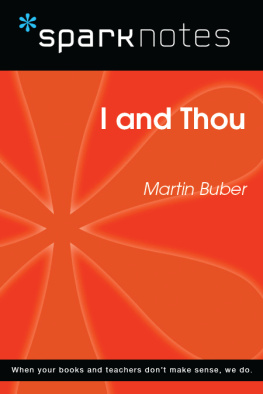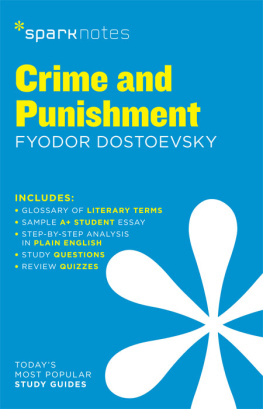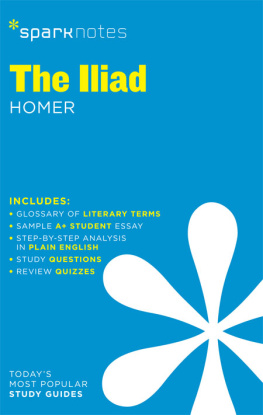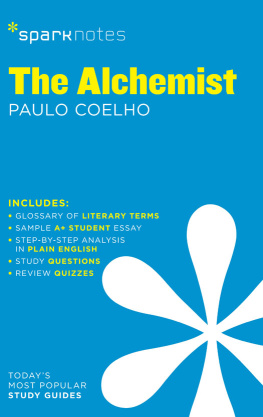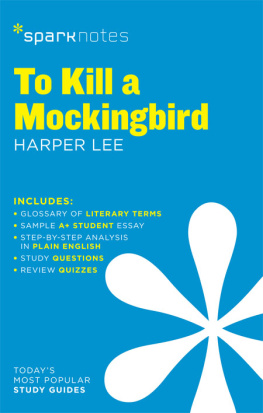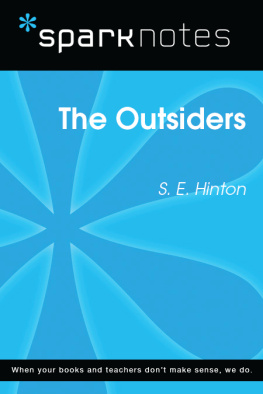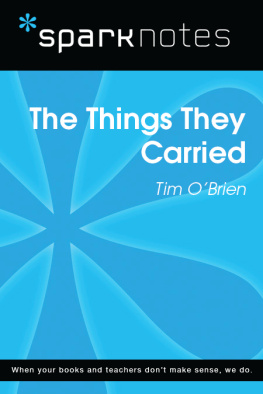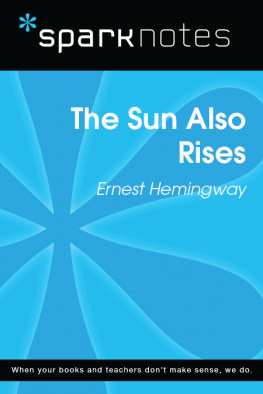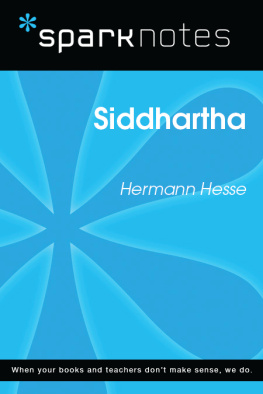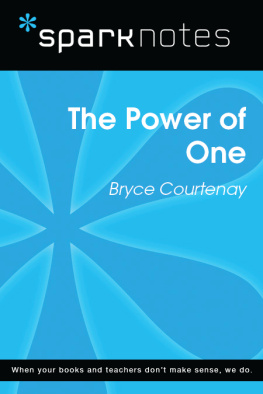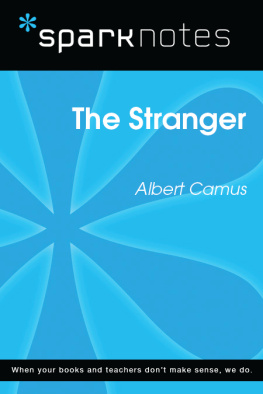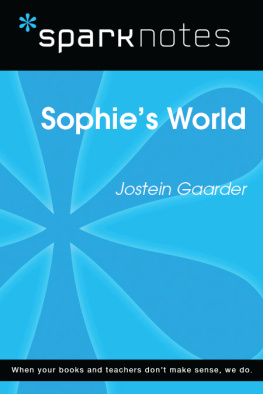SparkNotes - I and Thou
Here you can read online SparkNotes - I and Thou full text of the book (entire story) in english for free. Download pdf and epub, get meaning, cover and reviews about this ebook. year: 2014, publisher: Spark, genre: Religion. Description of the work, (preface) as well as reviews are available. Best literature library LitArk.com created for fans of good reading and offers a wide selection of genres:
Romance novel
Science fiction
Adventure
Detective
Science
History
Home and family
Prose
Art
Politics
Computer
Non-fiction
Religion
Business
Children
Humor
Choose a favorite category and find really read worthwhile books. Enjoy immersion in the world of imagination, feel the emotions of the characters or learn something new for yourself, make an fascinating discovery.
- Book:I and Thou
- Author:
- Publisher:Spark
- Genre:
- Year:2014
- Rating:4 / 5
- Favourites:Add to favourites
- Your mark:
- 80
- 1
- 2
- 3
- 4
- 5
I and Thou: summary, description and annotation
We offer to read an annotation, description, summary or preface (depends on what the author of the book "I and Thou" wrote himself). If you haven't found the necessary information about the book — write in the comments, we will try to find it.
I and Thou (SparkNotes Philosophy Guide)
Making the reading experience fun!
SparkNotes Philosophy Guides are one-stop guides to the great works of philosophymasterpieces that stand at the foundations of Western thought. Inside each Philosophy Guide youll find insightful overviews of great philosophical works of the Western world.
I and Thou — read online for free the complete book (whole text) full work
Below is the text of the book, divided by pages. System saving the place of the last page read, allows you to conveniently read the book "I and Thou" online for free, without having to search again every time where you left off. Put a bookmark, and you can go to the page where you finished reading at any time.
Font size:
Interval:
Bookmark:

2003, 2007 by Spark Publishing
This Spark Publishing edition 2014 by SparkNotes LLC, an Affiliate of Barnes & Noble
All rights reserved. No part of this publication may be reproduced, stored in a retrieval system, or transmitted in any form or by any means (including electronic, mechanical, photocopying, recording, or otherwise) without prior written permission from the publisher.
Sparknotes is a registered trademark of SparkNotes LLC
Spark Publishing
A Division of Barnes & Noble
120 Fifth Avenue
New York, NY 10011
www.sparknotes.com /
ISBN-13: 978-1-4114-7322-5
Please submit changes or report errors to www.sparknotes.com/.
10 9 8 7 6 5 4 3 2 1
Martin Buber was one of the great religious thinkers of the 20th century. He was born in Vienna, Austria in 1878, but sent at the age of three to live with his grandfather in Lvov, Galicia, because of his parents' failing marriage. Buber ended up spending his entire childhood in Lvov, and was greatly influenced by the towering figure of his caregiver, Solomon Buber. Solomon Buber was a successful banker, a scholar of Jewish law, and one of the last great thinkers of the Jewish Enlightenment or Haskalah. He was also a deeply religious man who prayed three times daily, shaking with fervor. Solomon Buber exposed his grandson to two of the three obsessions that would guide the younger Buber's thought: the mystical Jewish movement of Hasidism which tries to imbue the ordinary routines of daily life with a divine joy rooted in communal living, and the more intellectual movement of the Haskalah which tries to link the humanist values of the secular Enlightenment to the tenets of Jewish belief.
From 1896 until 1900, Buber studied philosophy and art history at the University of Vienna. There he discovered the intellectualism of philosophers such as Kant, Schopenhauer, and Nietzsche, as well as the Christian mysticism of Jakob Bohme, Meister Eckehart, and Nicholas of Cusa. It was probably while eagerly reading these works, and relating them to the spiritual childhood he had known in Lvov, that Buber began to formulate the questions that would lead him on his lifelong search for religious meaning: he began to ponder the sense of alienation (from fellow man, from the world, even from oneself) which overcomes every human being from time to time. He wondered whether this temporary alienation is an essential aspect of the human condition and whether it might indicate a deep-seated yearning for something necessary to human life, that is, for a true unity with the world and with God.
As an adolescent, Buber began his search for religious meaning by separating himself from the Jewish community. He ceased to observe the myriad strict Jewish laws and immersed himself in his own questions. He described himself as living "in a world of confusion." In 1897, early in his university career, Buber returned to the Jewish community, drawn by what would become the third fundamental influence in his life: modern political Zionism. Zionism sought to redefine Judaism as a nationality rather than simply a religion, with Hebrew as the Jewish language and Israel as the Jewish homeland. Buber quickly became active in the movement, particularly in its cultural and religious aspects. In 1901 he was appointed editor of the Zionist periodical "Die Welt", and in 1902, after leaving "Die Welt", he founded the publishing house of Judische Verlag.
By late 1902 Buber began to break away from Zionism and to rediscover Hasidism. He searched out the early literature of the Hasidic movement, and he became convinced that in its earliest incarnation, in the late 18th and early 19th centuries, it embodied the ideal religious stance: a relationship between god and man that is based in dialogue. He examined other religions as well, studying their history and thought, and developed his conception of this divine relationship in greater detail. In 1923 he published the result of two decades of thought in his greatest work, I and Thou.
In 1924, having finished and published I and Thou, Buber began to study the Hebrew Bible, and claimed to find in it the prototype of his ideal dialogical community. While continuing to collect Hasidic legends and to develop his theories of religion, he also began to translate the Hebrew Bible into German. In 1930 he was appointed professor of Jewish religion and ethics at the University of Frankfurt at Mainz. In 1933, when Hitler rose to power, Buber was forced to leave his university post and began to teach in the Jewish ghettos. He spent this period strengthening the religious and spiritual resources of German Jewry in the face of the overwhelming dangers they faced, primarily through adult education.
In 1938 Buber fled Germany for Palestine where he became professor of the sociology of religion at Hebrew University in Jerusalem. As he had been in Germany, Buber quickly became an active community leader in Palestine. He directed the Yihud movement, together with Y.L. Magnes, which sought to bridge Arab-Jewish understanding and to create a binational state. He also served as the first president of the Isreali Academy of Science and Humanities. In his later years, Buber began to apply his unique conception of man's relationship to the world to diverse fields. He developed a theory of psychotherapy based on the dialogical relationship and a theory of social philosophy intended as an alternative to Marxism.
Though Buber's philosophy has influenced thinkers in all religious traditions, he was first and foremost a Jewish thinker, and his intellectual development is best viewed in that historical context. Buber lived through a time of radical transition in the Jewish community: he saw the secular enlightenment seducing Jews away from their religious convictions, he witnessed the subsequent marshalling of orthodox forces in response to this secular threat, and he was an active part in the birth of modern political Zionism, which arose as an alternative to both the secularism and orthodoxy. All three of these trends affected Buber's life in tangible ways, and all three fed into his conception of the ideal relationship between man and world. As a Jew living through the age of secular seduction, Buber was exposed to the Western philosophical cannon that he reacted to and eventually joined; from his associations with Zionism and orthodox Judaism and Hasidism he obtained a unique understanding of the role that community should play in religious life.
Though Buber lived through a tumultuous period of Jewish history, the period that most influenced his thought actually took place a hundred years before his birth, in the late 18th century. It was then, in the wake of mass slaughters and staggering poverty, that the mystical movement of Hasidism first arose. It appealed to the working masses who felt alienated from traditional Judaism. As preached by the rabbis at that time, the essence of Judaism was thought to be the intellectually demanding and time consuming study of Jewish law, and the only way to be holy was to be a scholar. In practice this meant that only a small elite, who had both the money and the intelligence necessary to spend their days immersed in learning, could really consider themselves good Jews. The vast majority of Jews, impoverished and intimidated by anti-Semitism, felt that they did not even have their religion to turn to in their time of need.
Hasidism first arose in response to this need, expounded by the religious healer the Baal Shem Tov (meaning Master of the Good Name). Hasidism offered a new understanding of Judaism, one that could reach out to all members of the community. In this new view of Judaism, prayer, not study, was considered the most important religious activity. Ecstatic song and dance replaced solemn piety. Hasidism asserted that since all men can pray, and love God, and take joy in fulfilling God's rituals, all men can be equally holy. The movement had wide appeal among the lower classes, and it spread quickly throughout the Jewish communities of Eastern Europe. Traditional rabbis were unhappy with its rapid spread and tried to outlaw Hasidism. Within a few decades, however, these two branches of Judaism were forced to unite against the common enemy of secularism.
Font size:
Interval:
Bookmark:
Similar books «I and Thou»
Look at similar books to I and Thou. We have selected literature similar in name and meaning in the hope of providing readers with more options to find new, interesting, not yet read works.
Discussion, reviews of the book I and Thou and just readers' own opinions. Leave your comments, write what you think about the work, its meaning or the main characters. Specify what exactly you liked and what you didn't like, and why you think so.

